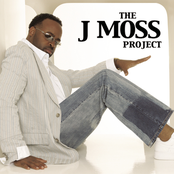The J Moss Project

Biography
Born and raised in Detroit, Michigan as James Moss, the son of Gospel star Bill Moss, Sr., James spent much of his childhood on tours with his father's popular group, Bill Moss and the Celestials, and his cousin's group The Clark Sisters. As an early teen, Moss was teamed with his brother Bill Jr. in the singing duo The Moss Brothers. They toured on weekends around the midwest and recorded two major label albums during their seven years together. In this period James developed as a keyboardist...
Born and raised in Detroit, Michigan as James Moss, the son of Gospel star Bill Moss, Sr., James spent much of his childhood on tours with his father's popular group, Bill Moss and the Celestials, and his cousin's group The Clark Sisters. As an early teen, Moss was teamed with his brother Bill Jr. in the singing duo The Moss Brothers. They toured on weekends around the midwest and recorded two major label albums during their seven years together.
In this period James developed as a keyboardist and burgeoning songwriter. He was also learning first-hand the business of music. He attended Michigan State University for two years, but the desire to write and perform was too strong, and he left to seek a career in music.
Musical career
Upon his return to Detroit, Moss signed with a small local Christian label Aviday Records[1] and released two albums to little fanfare. Yet, during this time he became acquainted with Paul Allen and Walter Kearney. The three began working together as PAJAM. Moss spent the mid-90s touring with The Clark Sisters and was signed, along with Karen Clark-Sheard, his cousin, to Island Records in 1996 to record a solo album.[1] While a proper release never materialized for Moss before Island Black Music shut its doors,[2] Clark's became a smash and introduced the Gospel world to the production powerhouse of PAJAM.
Over the next seven years, the PAJAM team became Gospel music's most prolific hitmakers. However, Moss' desire to perform never went away, and in 2003 he and Allen began writing songs for what would ultimately become The J. Moss Project, released in September 2004 on GospoCentric Records.
Though PAJAM's work has been seen as a revolutionary blend of gospel and hip-hop style, The J. Moss Project is a surprisingly traditional affair. The set largely relies on familiar arrangements, and keeps its focus on Moss's clear tenor voice and strong backing choir vocals. The album made a grand entry with the upbeat lead single "I Wanna Be".
The disc includes a number of upbeat gospel numbers such as "Don't Pray and Worry" and "Psalm 150". J. Moss' lithe falsetto at times draws comparison to the likes of Prince and Tonéx on "Livin' 4". There are also several gentle ballads such as "Give You More" and the album's anthemic single "We Must Praise" that display J. Moss' range as a vocalist and songwriter.
V2... The J Moss Project
Finally, on April 3, 2007, J Moss released his second album V2... The J Moss Project through GospoCentric Records. Appearances made by contemporary Gospel group 21:03, Moss's cousin Kierra "Kiki" Sheard, Kirk Franklin, his cousin Karen Clark-Sheard, Marvin Winans of the famed Winans family, Byron Cage, and American comedian Steve Harvey. Three bonus tracks were originally thought to be regular album tracks. The bonus tracks are "Florida", "73 Degress", and "Everybody Ain't Got a Word". Of the album tracks on this release, an instant standout is the track "Dance", featuring Kirk Franklin, which riffs off of an infectious sample of Morris Day & The Time's early 1980s smash "777-9311".
Read more on Last.fm. User-contributed text is available under the Creative Commons By-SA License; additional terms may apply.
